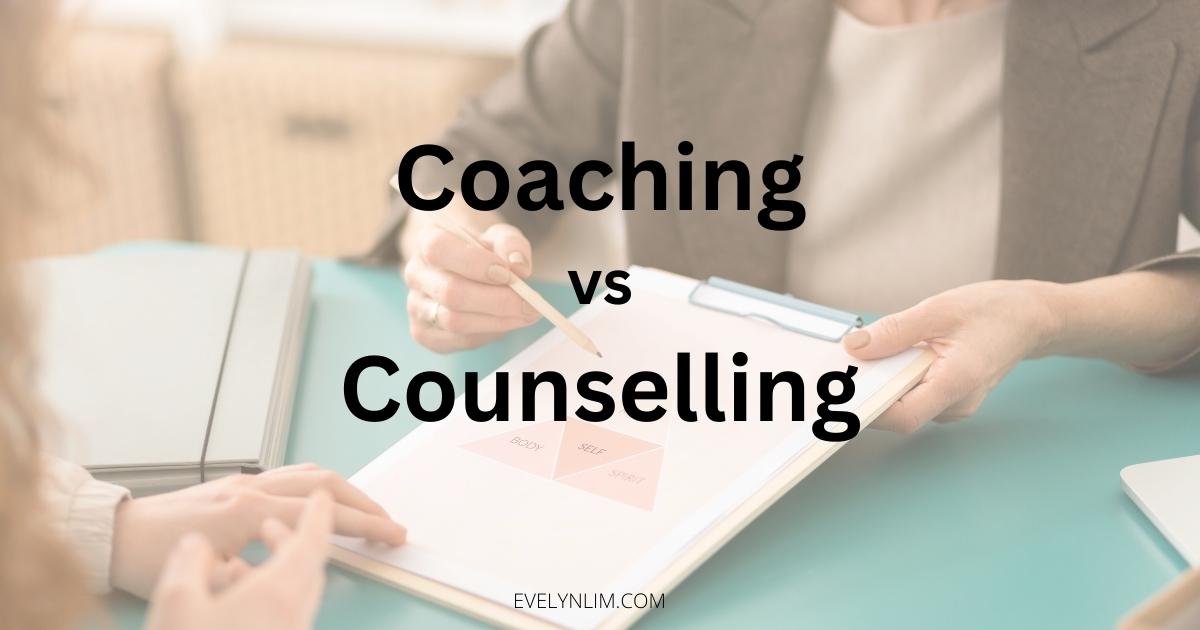
Are you wondering what the difference between coaching and counselling is?
Who should you be hiring: coach or counsellor?
Do both professions mean the same thing or are they different?
I encounter these type of questions a lot. Many people don’t know what the differences are. They get confused over which professional can best help them. As a Certified Coach with a post-graduate diploma in counselling psychology, I hope to clarify what the differences are.
Whether a person is a coach or counsellor, they offer support for a client’s well-being through conversations. Even though there are similarities, they can differ in terms of their approach, objectives, and the specific needs they address. Understanding their differences can help you to assess which professional to be working with.
Coaching is primarily future-focused and goal-oriented. Coaches work with clients to identify their aspirations, set specific goals, and develop actionable plans to achieve them. The process is dynamic and often involves challenging clients to step out of their comfort zones, so that they can realise their full potential. Coaching is commonly used in professional development, career transitions, leadership training, and personal growth. The relationship between coach and client is typically collaborative, with an emphasis on accountability and measurable progress.
Some people use the words “counselling” or “therapy” interchangeably, whereas others make a clear distinction. Counselling typically focuses on specific issues or problems. It is often short-term and centers on providing practical advice and strategies to help individuals manage particular situations, such as coping with stress, dealing with a loss, or navigating a career change. Counsellors are generally trained to offer support, guidance, and education to help clients develop effective coping skills.
Therapy, or psychotherapy, is generally more in-depth and long-term. It aims to address deeper, underlying psychological issues that may be contributing to a person’s distress. Therapists evaluate and treat mental health concerns like anxiety disorders, mental illness, behavioural problems, alcohol and substance abuse. They help their clients heal trauma and develop healthier coping strategies. Therapy often involves exploring a person’s thoughts, emotions, and behaviours to uncover patterns that might be rooted in past experiences. This process helps clients gain a better understanding of themselves and make more profound changes to improve their overall mental health.
For a meaningful comparison to coaching, we will group both “counselling” and “therapy” as one big area.
Coaches utilise a variety of techniques to facilitate growth and achievement. These may include motivational interviewing, goal-setting frameworks, and performance assessments. Coaching sessions are typically structured, with a clear agenda and specific outcomes to be achieved. Coaches may also incorporate tools such as personality assessments and feedback mechanisms to help clients gain insights and track their progress.
Counsellors (and therapists) employ therapeutic techniques based on psychological theories and practices. These might include cognitive-behavioral therapy (CBT), psychodynamic therapy, and humanistic approaches. Counselling sessions are generally more flexible and client-driven, allowing for in-depth exploration of issues as they arise. Techniques such as active listening, reflection, and guided self-exploration are commonly used to help clients gain a deeper understanding of themselves and their experiences.
Obviously, there are overlaps between what a coach and a counsellor do. For example, coaches also use techniques such as active listening and they hold safe spaces for clients to reflect and to process their experiences. Counsellors can also help their clients to address their stress levels, so that they can improve their performance at work.
The qualifications and training required for coaches and counsellors differ. Coaches often come from diverse professional backgrounds and may hold certifications from recognized coaching organisations, such as the International Coach Federation (ICF). These certifications typically require training in coaching methodologies and adherence to ethical standards, but do not necessarily require a degree in psychology or mental health.
Counsellors (and therapists), however, typically hold advanced degrees in psychology, counselling, or social work, and must be licensed to practice in their respective fields. This licensing process involves rigorous academic training, supervised clinical experience, and ongoing professional development. Counsellors are also bound by strict ethical guidelines and standards of practice to ensure the safety and well-being of their clients.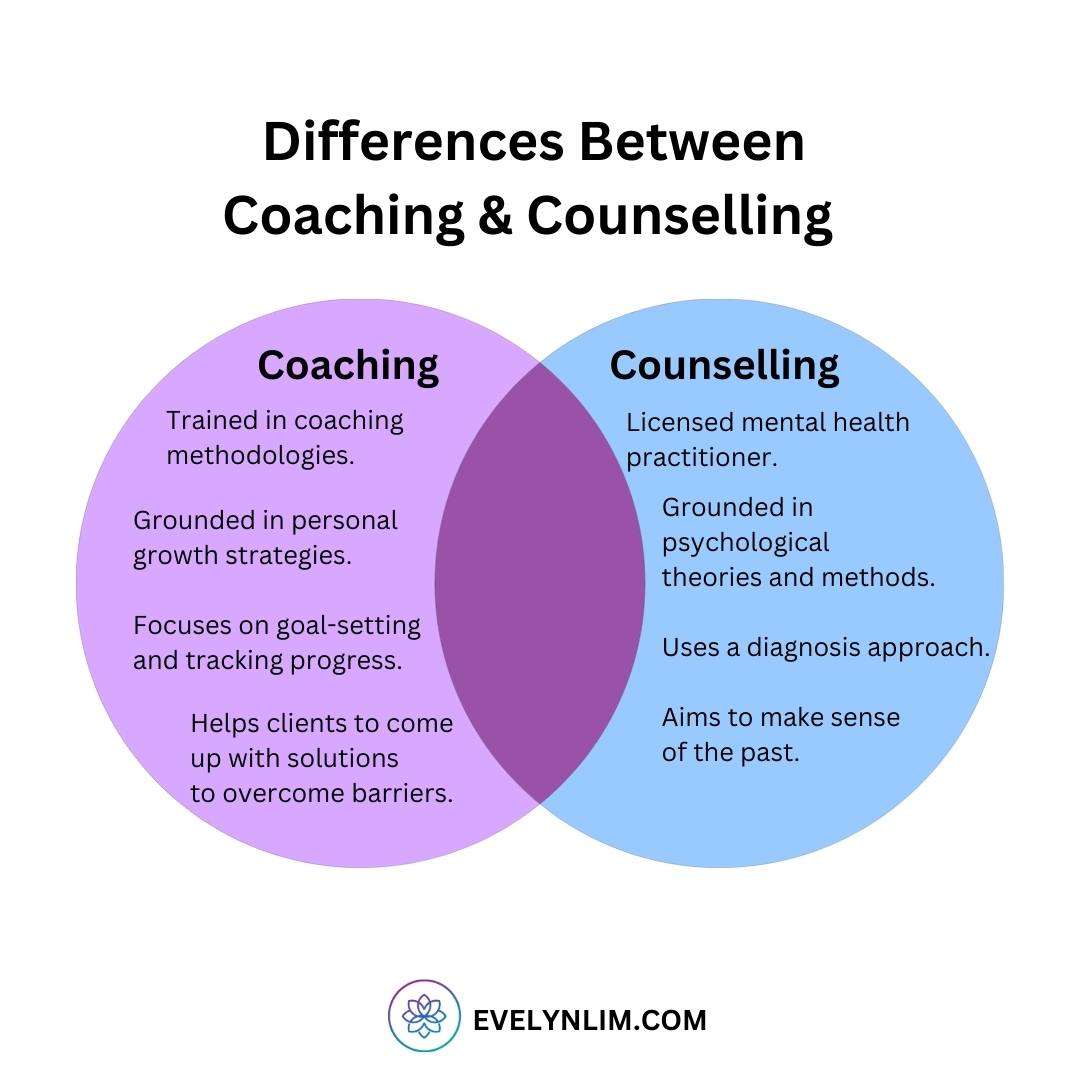
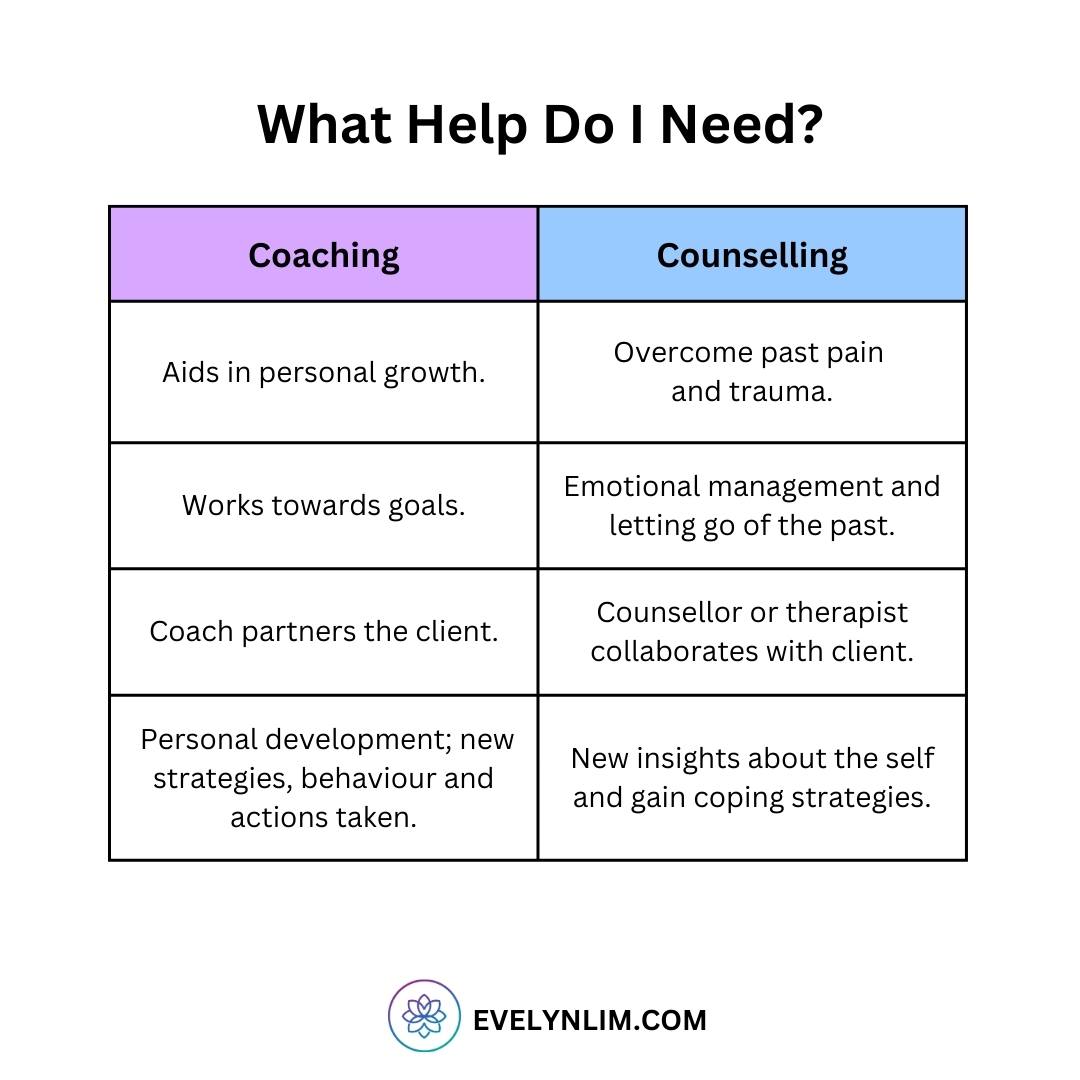
Whether it is better that you work with a coach or counsellor depends on your needs.
When deciding whether to hire a coach or a counsellor, it is crucial to consider the nature and severity of the issues you are facing. If you are dealing with deep mental health issues, such as those outlined in the Diagnostic and Statistical Manual of Mental Disorders (DSM-5) eg. depression, anxiety disorders, bipolar disorder, or post-traumatic stress disorder (PTSD), seeking a counsellor or therapist is the more appropriate course of action. These professionals are trained to diagnose and treat mental health conditions, providing therapeutic interventions that can help you manage and overcome these challenges. Other circumstances where therapy is more suitable…
- you need medication to help
- emergency or crisis situation (such as self-harm or suicide ideation)
- active overuse of drugs and alcohol
- need mental health support from trauma-based psychotherapy.
On the other hand, if you are generally mentally able to process thoughts but you are looking to enhance your performance, achieve specific goals, or navigate life transitions, a coach may be the right choice. Coaches can provide the structure, motivation, and accountability needed to help you reach your personal and professional aspirations.
What if you are in a situation that falls in between? Here are some common scenarios…
- you are feeling down because you are going through a difficult period (eg. relationship breakdown) and would like to improve communication between you and your spouse.
- you are suffering from low self-esteem which impacts your ability to reach your goals.
- you are going through anxiety issues but you are still able to show up for work.
- you are in your own way of success due to self-rejection and criticism with an inability to love and accept yourself.
In these scenarios, either a coach or a counsellor can help. But what if you can find a professional who has been trained in more than one discipline?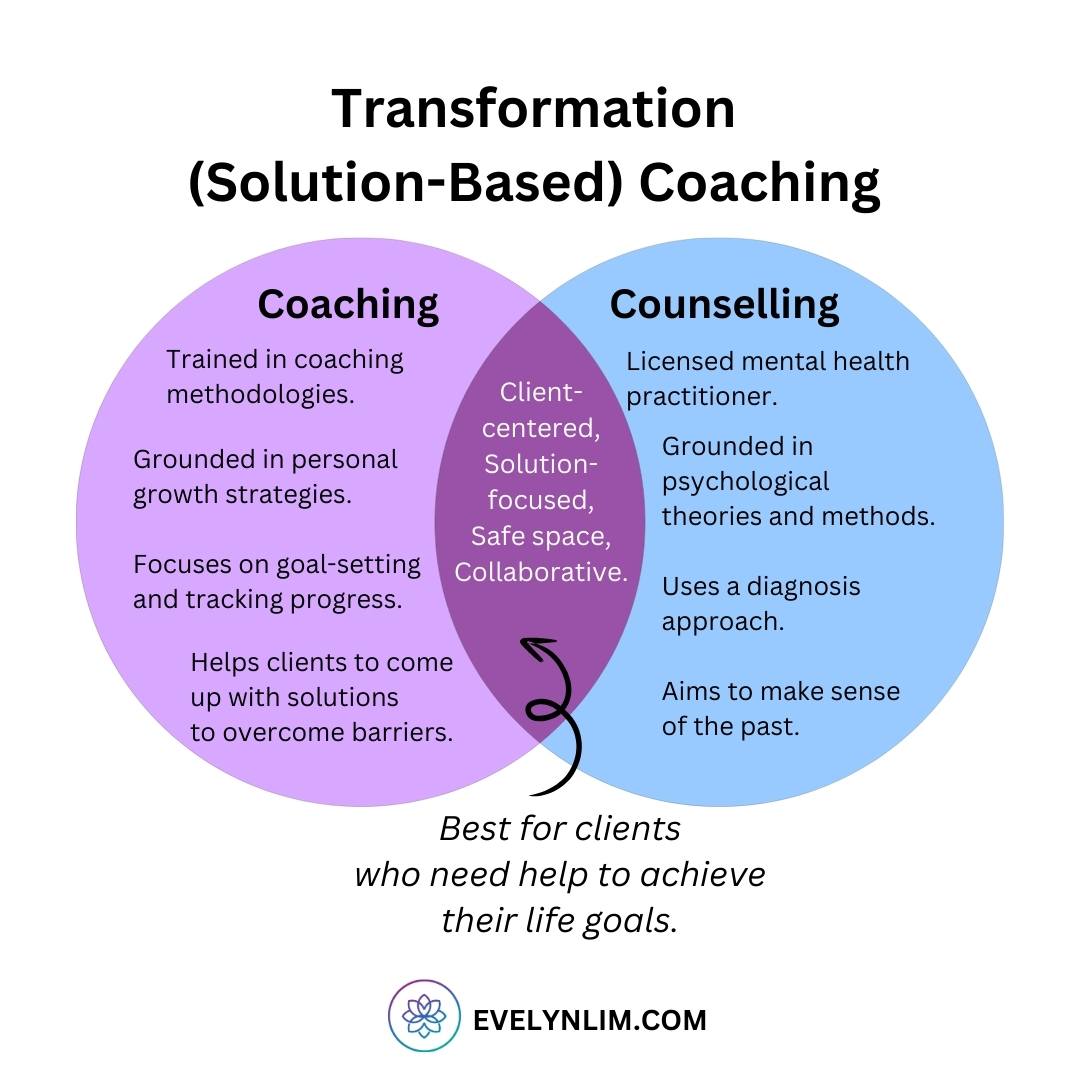
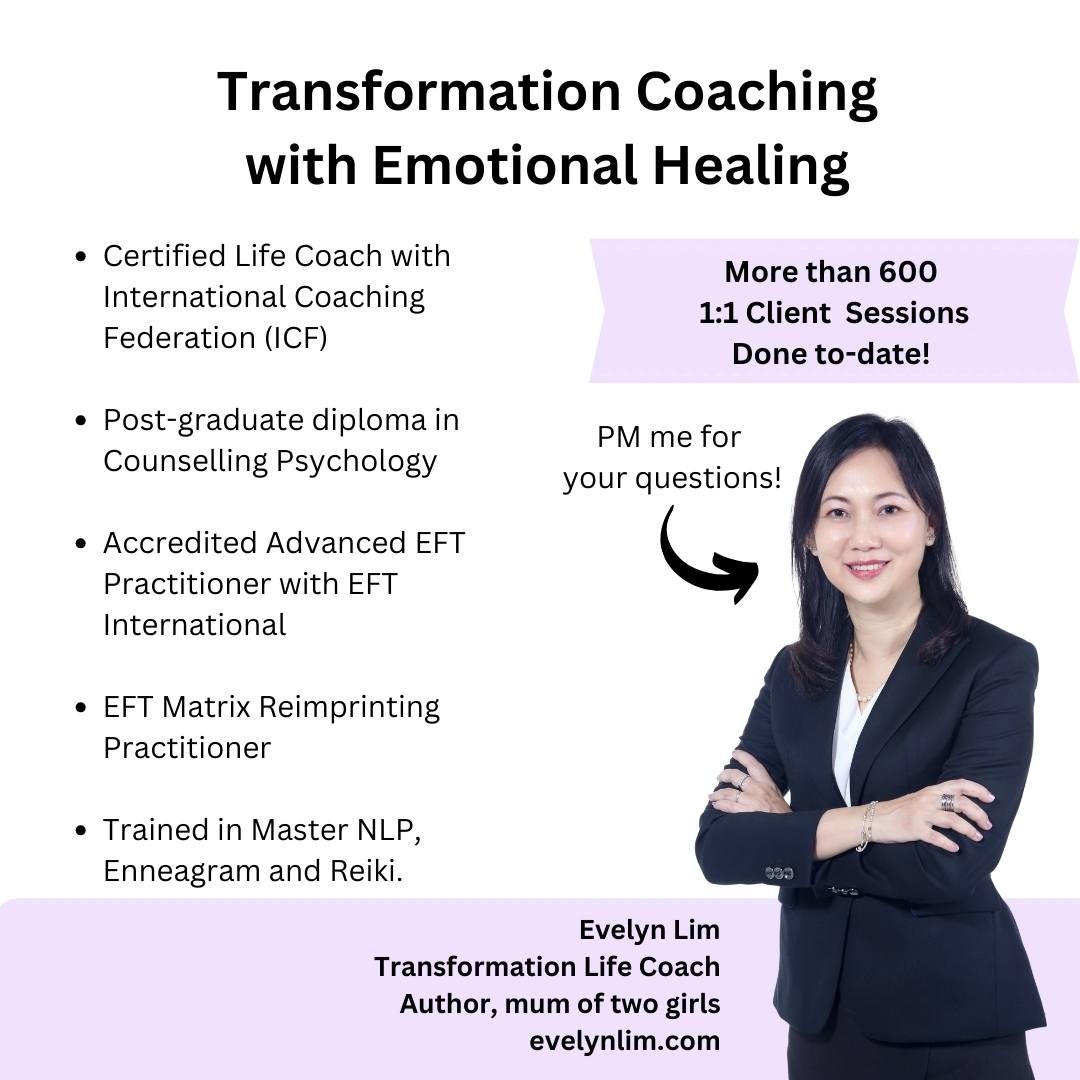
As a Certified Coach with ICF with a counselling psychology background and as an accredited advanced EFT practitioner, I work with clients who are mentally able. Clients would like to move towards their goals, but find themselves being held back by their past. We could be working on inner child healing for letting go of past rejection issues and making mindset changes in order to boost confidence. At the same time, be working towards taking goal-related actions. Clients are not just having conversations (whether during either a coaching or a counselling session), we are also targetted in dealing with their emotions on a somatic level (via the use of EFT tapping).
Not to worry, as professionals, we are taught to cross-refer in the event that we believe that a client would benefit more from working with a different practitioner. So if I am not able to assist you, I will be recommending a colleague from the counselling field or another professional who can best fits your needs. I’m glad to have an extensive network of colleagues in the mental health and coaching arena.
What’s important is that you seek help. I highly recommend not suffering in silence or prolonging getting the assistance required. It would be very helpful to have an initial chat with the person that you are considering to work with. It is how you can get a better idea if this person is able to assist you with your challenges.
Apply for a Discovery Call with Me Here
All the best,
Evelyn Lim
Transformation Coach

